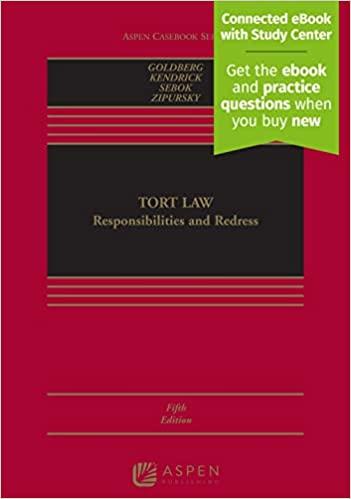Question
Doe v. Bolton was a companion case to Roe v. Wade, decided by the Supreme Court on the same day in 1973. In the case,
Doe v. Bolton was a companion case to Roe v. Wade, decided by the Supreme Court on the same day in 1973. In the case, there was an issue regarding the scope of abortion rights for post-viability abortions. Specifically, the Court considered what it means for post-viability abortions to be permissible only if "necessary for the preservation of the mother's life or health." On this point, the Court in Doe held that for purposes of this exception, "health" could be construed to include the woman's psychological aswell as her physical wellbeing. Moreover, the Court concluded that the professional judgment of the physician performing the abortion procedure "may be exercised in the light of all factors -- physical, emotional, psychological, familial, and the woman's age -- relevant to the wellbeing of the patient. All these factors may relate to health. This allows the attending physician the room he needs to make his best medical judgment. And it is room that operates for the benefit, not the disadvantage, of the pregnant woman."
In view of Dobbs v. Jackson Women's Health (2022), Doe is no longer the law of the land. However, some states are still struggling to define the scope of a permissible post-viability "health" exception to state-level abortion bans, ifany is to be permitted. For example, Massachusetts recently passed a law, over the governor's veto, that willallow abortions after 24 weeks of pregnancy if "necessary, in the best medical judgment of the physician, to preserve the patient's physical or mental health" and in cases of a fatal fetal anomaly. The governor, Charlie Baker, opposed the law due to concerns with the ambiguity of the language surrounding a "mental health" exception. The Massachusetts law also permits 16- and 17-year-olds for the first time to seek an abortion without parental consent or a judicial hearing. Governor Baker opposed this provision as well.
QUESTION -
Should minors be required to obtain parental or judicial consent to seek an abortion at any stage of a pregnancy, or as least to notify a parent or guardian?
Step by Step Solution
There are 3 Steps involved in it
Step: 1

Get Instant Access to Expert-Tailored Solutions
See step-by-step solutions with expert insights and AI powered tools for academic success
Step: 2

Step: 3

Ace Your Homework with AI
Get the answers you need in no time with our AI-driven, step-by-step assistance
Get Started


